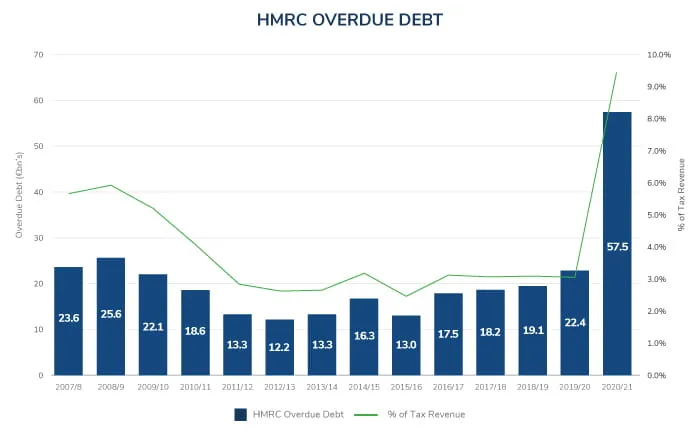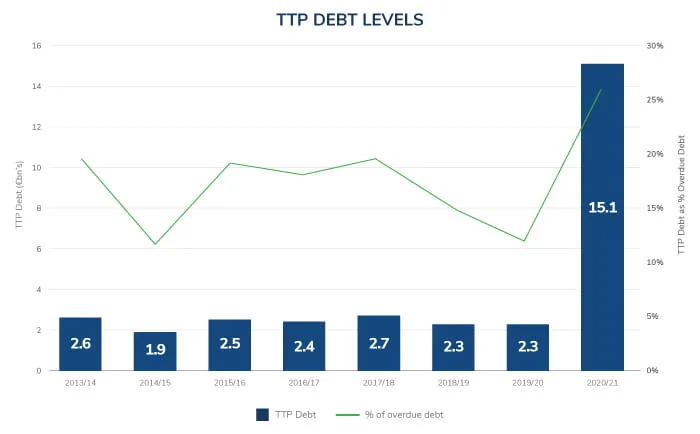Her Majesty’s Revenue & Customs (HMRC) has released its Annual Accounts for the financial year 2020-2021. As Kroll predicted in its last HMRC update, overdue debt has increased significantly to £58bn. This represents a record-breaking level of debt for HMRC to collect in a period of financial recovery, with the UK besieged by multiple macro and local economic challenges.
Overdue Debt
Over the 13 years prior to the 2020-21 financial year, HMRC’s overdue debt averaged £18.1bn, peaking in 2008/09 following the financial crisis, where the debt level approached £26bn. As seen in the figure below, the current level of HMRC debt has increased by £38.5bn (203%) to £57.5bn. Total overdue debt actually peaked at £72bn in August 2020, before falling to its year-end position of £57.5bn.
Overdue debt as a percentage of tax revenue, which since 2011/12 had stabilised at between 2% and 3%, has also risen to 9.4%.

There are several reasons for such alarming levels of HMRC debt and the primary reason being the support measures put in place throughout the COVID-19 pandemic, restrictions placed on HMRC’s ability to utilise its enforcement powers and HMRC changing their stance and overall approach on the collection of debt.
More than half of the £57.5bn overdue debt (£31.3bn) relates to VAT deferred through the coronavirus VAT Deferral Scheme/VAT New Payment Scheme. Here HMRC offered up to half a million businesses the option to defer VAT payments between 20 March 2020 and 30 June 2020 to the following tax year and gave the option to pay overdue VAT over smaller, interest free instalments.
Revenue Losses
HMRC reported a decrease in revenue losses of £2.12bn from £4.08bn in 2019/20 to £1.96bn in 2020/21, this was due to the reduction in corporate insolvencies. Revenue losses occur when HMRC formally cease collection activity.
The reduction in insolvencies was partly caused by the government measures to financially support businesses during the COVID-19 pandemic and the introduction of temporary restrictions on the use of statutory demands and winding up petitions.
For the period ended 31 March 2021, there were 9 cases (23 cases in 2019/20) where the loss exceeded £10 million, totaling £320 million (£634 million in 2019/20).
There were six write-offs (19 cases in 2019 to 2020) relating to Insolvency, totaling £126 million (£391 million in 2019 to 2020).
Although it is certain that large numbers of businesses would have failed had it not been for the introduction of government support measures, many of the measures have now ended, and HMRC will be facing pressure from the government to ensure the debts are collected.
TTP Debt Levels
Another reason for the debt levels increase is due to HMRC’s increased willingness to negotiate Time To Pay (TTP) arrangements with businesses. Due to the volume of cases, HMRC set up teams dedicated to dealing with specific types and amounts of HMRC arrears. The teams initially agreed deferrals of tax arrears on the condition that businesses either pay off the debt in full or contact HMRC in the future to negotiate a TTP (i.e.- an affordable repayment plan over an agreed period).
In the tax year 2020/21, HMRC negotiated approximately 864,000 (2019/20: 648,000) TTP arrangements, an increase of 33.3% from the tax year 2020/21. This increase has resulted in the quantum of debt under a TTP rising by 557% to £15.1 billion. The graph below highlights the significance of this increase, when compared to the £2.78bn average debt level over the six years prior.

The coronavirus pandemic has presented HMRC with the extremely difficult task of assessing businesses future trading prospects in a period of unprecedented uncertainty. Key questions such as business viability and past compliance records will be at the forefront of HMRC’s collection process.
HMRC has been forced to take a much more open view on these questions, as many viable businesses have been plunged into extended periods of losses due to closures, national and regional lockdowns, along with sudden changes in consumer spending and habits.
Producing reliable forecasts has become much more difficult and something that management teams must revisit frequently. In many ways HMRC’s greatest challenge is to find a somewhat unnatural equilibrium as a collector of taxes whilst simultaneously supporting UK businesses.
Ultimately HMRC will be responsible for deciding which options are best for the UK taxpayer in the orderly collection of overdue taxes, while safeguarding employment and the ongoing recovery of the UK economy. The TTP scheme has been a resounding success since it was introduced in 2008/9, and it has facilitated the repayment of billions of pounds of overdue tax debts. What is clear is that the scheme is going to play a vital role in delivering the orderly repayment of overdue taxes over the next three years.
HMRC’s Future Outlook
The accumulation of unprecedented levels of overdue debt, debt tied up in TTP arrangements and the significant reduction in the numbers of insolvencies, puts HMRC in a difficult predicament. It is their responsibility to act in the UK government’s best interests: to manage the levels of overdue debt whilst also ensuring enforcement action is taken against unviable businesses that are arguably trading to the detriment of UK taxpayers.
Some enforcement tactics against unviable businesses are therefore unavoidable, however, HMRC has shown throughout the pandemic that it is keen to support UK businesses. HMRC’s states in its latest accounts, that it has actively ‘reviewed and altered the tone of (their) communications, with different messaging determined by whether customers had experienced a high or low COVID-19 impact as well as offering ‘more flexible payment options such as longer TTP arrangements and extended review periods’.
Kroll expects this will continue to be the case and HMRC should be accommodating with businesses that submit strong proposals that warrant support and that include evidence of:
- An accurate schedule of arrears reconciled to HMRC’s statement of liabilities
- A summary of the background to the request, including specific impacts of COVID-19
- Mitigating actions that have been made and what future actions are being taken to ensure ongoing compliance with the TTP
- A summary of the support provided by other stakeholders (lenders, suppliers, shareholders)
How Kroll Can Help
Kroll’s Tax Arrears Solutions team can help you or your client negotiate a Time To Pay (TTP) arrangement with HMRC and manage other key stakeholders during this period, which is often a key component of a successful turnaround plan that preserves a company’s future and safeguards jobs. We use a hands-on approach to help clients facing financial uncertainties, working with management teams and their advisors to review working capital management and devise solutions to improve cash flow.
Since January 2020, our experts have secured over 59 TTP arrangements with a total debt value in excess of £100 million and safeguarding over 10,000 jobs. Contact us today to find out how we can help you.

